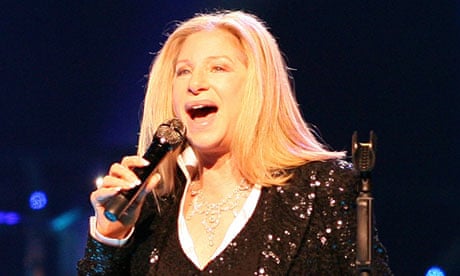If anyone was shocked by Barbra Streisand charging £450 for the best seats at her London shows this week, they obviously hadn't been to a top-tier gig recently. In the last few years, ticket prices to the biggest tours have shot so far northward that, in 2012, Madonna advised fans to "work all year" if they wanted to be able to afford to see her.
A £450 ticket could possibly be justified as a once-in-a-lifetime indulgence, but how can we justify a parallel trend among some mid-league acts, who are charging disproportionately high prices for shows at medium-sized venues? Reconstituted Scottish croonsters Texas, for instance, are asking a top price of £50 for upcoming dates; middlingly successful Los Angeles MC Tyga and American R&B star Keyshia Cole, who's never had a major UK hit, demanded around the same on UK tours last month, and the top price for soul singer Keith Sweat, mildly popular here in the 90s, is £60. Perhaps most unexpectedly, given his relatively modest success as a solo act, former UB40 frontman Ali Campbell is also charging £50.
Fifty pounds is comparatively affordable, but it's also a substantial psychological leap from the £30 or that seemed to have become the standard for mid-table gigs (as a point of comparison, you can see Patti Smith in London this month for £31, Steve Winwood for £36 and double Brit-winner Ben Howard for £25). Why is it happening? It's hard to say with any authority, because the promoters and agents (and sometimes artists themselves) who set the prices refuse to explain; Texas's publicist declined an interview request with: "They don't want to talk business." But it's easy to guess.
They've observed the Madonnas and Streisands making a fortune, and decided to risk jumping into a much higher price bracket themselves. Their reward: as our idea of what's acceptable is pushed upward, despite being way out of line with inflation, eventually £50 will become the standard price point for Academy-level acts. That will be a sad day, and surely a counterproductive one – we're perpetually told touring income is vital to artists, so turning gigs into events only the well-paid can afford (which brings to mind that pre-recessionary consumer stereotype, fifty-quid bloke) seems certifiable. But one insider, who didn't want to be named, thinks it's inevitable: "People don't blink at paying £50 if that's the price they have to pay."
If we look at individual artists, we'll find different semi-justifications. Cole, for instance, had never played in Britain before, so fans may have viewed £50 as worth it for the kudos of being at her first gig. According to Paul Scaife of the music industry website Record of the Day, some American artists need persuading to come: "And if it's someone who's not well-known enough to do a dozen dates, the cost of getting them here for a couple of dates, with their entourage, no doubt, gives you a fixed cost before you've even started."
Meanwhile, Texas, though never quite superstars in the 80s, have nostalgia value. And some acts want to position themselves as luxury brands – the 2010 X-Factor runner-up Rebecca Ferguson charged £42 for her first UK tour, signalling her intention of roping in an adult audience with money to spend. Others, such as former Disney actor Selena Gomez, can demand what they like (£40, in her case) because her tweeny fans' parents will pick up the tab.
"There's a lot of psychology in [ticket pricing]," says the insider. "You don't want to devalue a show with a price that's too low." Devalue? If anything, promoters do the opposite. Music Week editor Tim Ingham has heard of promoters who, faced with unsold tickets, actually bumped up the price. "They'll have a third of house still to sell a week before the gig, and they've raised the price rather than lowering it, because when you raise it you create demand." In other words, an expensive ticket will build a buzz, "especially if opinion-formers go to the gig, then talk about it afterwards". In any case, he sympathises with the promotion industry: "The risk to promoters is extremely high, because their margins are so tight. They only make money if 99% of the house sells out."
Obviously, if an artist is worth it to you, you'll pay up. But the depressing conclusion is that you'd better get used to the idea of their being worth £50 a pop.

Comments (…)
Sign in or create your Guardian account to join the discussion